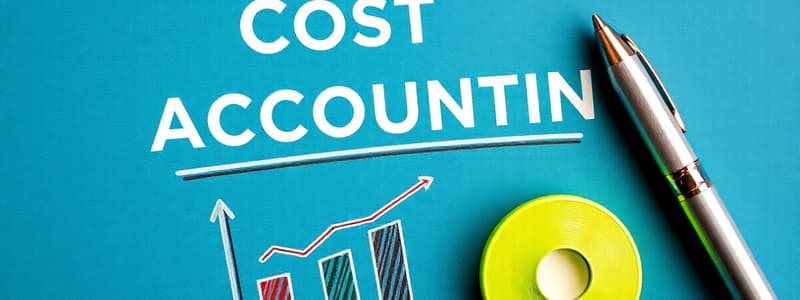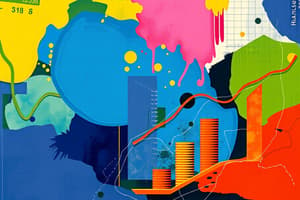Podcast
Questions and Answers
What type of cost varies directly with the volume of output?
What type of cost varies directly with the volume of output?
- Semi-variable cost
- Variable cost (correct)
- Fixed cost
- Controllable cost
Sunk costs are relevant for decision making.
Sunk costs are relevant for decision making.
False (B)
What is the term for costs that can be influenced by specific members of an organization?
What is the term for costs that can be influenced by specific members of an organization?
Controllable cost
The costs associated with warehousing and delivery vans fall under __________ costs.
The costs associated with warehousing and delivery vans fall under __________ costs.
Match the following costs with their definitions:
Match the following costs with their definitions:
What is the term used for the total costs attributed to manufacturing a product?
What is the term used for the total costs attributed to manufacturing a product?
Closing stock is subtracted when calculating the cost of production.
Closing stock is subtracted when calculating the cost of production.
What is calculated by adding factory overheads and opening work-in-progress to prime cost?
What is calculated by adding factory overheads and opening work-in-progress to prime cost?
The formula for calculating the cost of goods sold includes adding selling and distribution overheads to the cost of _____ .
The formula for calculating the cost of goods sold includes adding selling and distribution overheads to the cost of _____ .
Match the following components with their correct definitions:
Match the following components with their correct definitions:
What is the primary purpose of cost accounting?
What is the primary purpose of cost accounting?
Cost centers are used to group all the costs of a business together.
Cost centers are used to group all the costs of a business together.
What are the costs associated with producing one additional unit of output called?
What are the costs associated with producing one additional unit of output called?
Total Revenue is calculated by multiplying price by ______.
Total Revenue is calculated by multiplying price by ______.
Match the following cost concepts with their definitions:
Match the following cost concepts with their definitions:
Which of the following best describes variable costs?
Which of the following best describes variable costs?
A firm can only use one pricing strategy at a time.
A firm can only use one pricing strategy at a time.
What is the formula for calculating variance in standard costing?
What is the formula for calculating variance in standard costing?
Which of the following represents a direct material cost?
Which of the following represents a direct material cost?
Indirect labour costs are related directly to production operations.
Indirect labour costs are related directly to production operations.
The cost incurred for the remuneration of employees is categorized as _____ costs.
The cost incurred for the remuneration of employees is categorized as _____ costs.
Which of the following is considered an indirect expense?
Which of the following is considered an indirect expense?
Match the following types of costs with their definitions:
Match the following types of costs with their definitions:
Selling cost is associated with administrative tasks.
Selling cost is associated with administrative tasks.
Name one example of a direct labour cost.
Name one example of a direct labour cost.
Flashcards
Cost Accounting
Cost Accounting
Analyzing and recording costs related to production of goods or services.
Cost Center
Cost Center
A part of a business where specific costs can be tracked.
Full Costing
Full Costing
Method of allocating indirect costs among products.
Absorption Costing
Absorption Costing
Signup and view all the flashcards
Marginal Costing
Marginal Costing
Signup and view all the flashcards
Standard Costing
Standard Costing
Signup and view all the flashcards
Total Revenue
Total Revenue
Signup and view all the flashcards
Break-Even
Break-Even
Signup and view all the flashcards
Direct Materials
Direct Materials
Signup and view all the flashcards
Indirect Materials
Indirect Materials
Signup and view all the flashcards
Direct Labor
Direct Labor
Signup and view all the flashcards
Indirect Labor
Indirect Labor
Signup and view all the flashcards
Production Cost
Production Cost
Signup and view all the flashcards
Administration Cost
Administration Cost
Signup and view all the flashcards
Selling Cost
Selling Cost
Signup and view all the flashcards
Fixed Cost
Fixed Cost
Signup and view all the flashcards
Variable Cost
Variable Cost
Signup and view all the flashcards
Semi-variable Cost
Semi-variable Cost
Signup and view all the flashcards
Controllable Cost
Controllable Cost
Signup and view all the flashcards
Uncontrollable Cost
Uncontrollable Cost
Signup and view all the flashcards
Prime Cost
Prime Cost
Signup and view all the flashcards
Factory Overhead
Factory Overhead
Signup and view all the flashcards
Work-in-Progress (WIP)
Work-in-Progress (WIP)
Signup and view all the flashcards
Cost of Goods Sold (COGS)
Cost of Goods Sold (COGS)
Signup and view all the flashcards
Cost of Production
Cost of Production
Signup and view all the flashcards
Study Notes
Financial Management - Unit 1: Cost Accounting
- Cost accounting is a vital part of financial management.
- Costs are incurred in the process of producing a good or service to get it to the customer.
- Identifying where costs arise is crucial for business success.
- Examples of costs include direct materials, direct labor, factory overhead, selling expenses, and administrative costs.
Costs and Budgeting
- Costs and budgeting are interrelated aspects of cost accounting.
- Total revenue is a key element in assessing profit and cost efficiency.
- Cost centers and profit centers are important operational divisions in evaluating cost allocation and profitability.
- Break-even analysis helps identify the point where total revenues equal total costs, meaning there is no profit or loss.
Costing Techniques
- Absorption costing: All costs (direct and indirect) are absorbed into production costs.
- Marginal costing: Only variable costs are included in the product cost. Contribution margin is the excess of selling price over variable costs and contributes to covering fixed costs.
Cost Centers
- Cost centers are parts of a business where specific costs are attributed.
- Examples include a particular location, a section of the business, a capital asset, or a human resource department.
- These centers are useful for identifying where costs arise and how to manage them effectively.
Costing Methods
-
Full costing (also known as absorption costing) is a method used to allocate indirect costs to a range of products.
-
This involves allocating indirect costs based on the proportion of direct costs for each product.
-
Absorption costing allocates all incurred costs (direct, indirect, semi-variable, and selling costs) to specific cost centers. More accurate allocation.
-
Marginal costing considers only variable costs in the cost of a product. The difference between the selling price and variable cost contributes to covering fixed costs.
Standard Costing
- Standard costing involves establishing expected costs for production.
- Variances (differences between actual and standard costs) are analyzed to identify areas of inefficiency or efficiency.
- Monitoring these variances is crucial to improve business performance.
Total Revenue
- Total revenue is calculated by multiplying the price of a product by the quantity sold.
- Price elasticity of demand is important in evaluating price changes and their impact on total revenue.
- Marketing mix (7 Ps) strategies can influence the quantity sold.
Break-Even Analysis
- Break-even analysis helps determine the point where total costs equal total revenues (no profit or loss).
- Total costs and total revenue are key figures in break-even analysis.
- Margin of safety is the excess of expected sales or revenue over the break-even point.
Cost Concepts
- Cost: actual or notional expenditure incurred for a given thing.
- Costing: Techniques and processes of cost determination for products or services.
- Cost accounting: The process of recording and accounting for all cost elements.
Classification of Cost (According to Elements)
- Materials: Raw materials used to create products. Direct materials are easily identifiable with output; indirect materials are not.
- Labor: Direct labor is directly involved in production operations; indirect labor is involved in support functions.
- Expenses: Direct expenses are identifiable with specific products; indirect expenses are not.
Classification of Cost (According to Functions)
- Production cost: Cost associated with the entire production process (raw materials, labor, etc.).
- Administration cost: Cost involving management, policy-making, and controlling operations.
Classification of Cost (According to Nature)
- Fixed cost: Costs that remain constant regardless of production levels.
- Variable cost: Costs that change directly with production levels.
- Semi-variable cost: Costs that have both fixed and variable components.
Costing Concepts
- Product costing: Expenses of a product are analyzed under various heads. Product cost or cost sheet will be a statement showing the total cost.
Specimen of Cost Sheet (Format)
This section provides a format of a cost sheet showing the steps of calculating the cost of production and cost of goods sold. Includes opening stock, purchases, closing stock, direct wages, and expenses, factory overhead, opening/closing work-in-progress, administration overheads, opening/closing finished goods, and selling/distribution overheads.
Studying That Suits You
Use AI to generate personalized quizzes and flashcards to suit your learning preferences.




